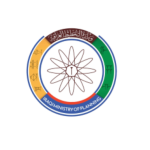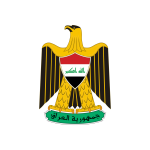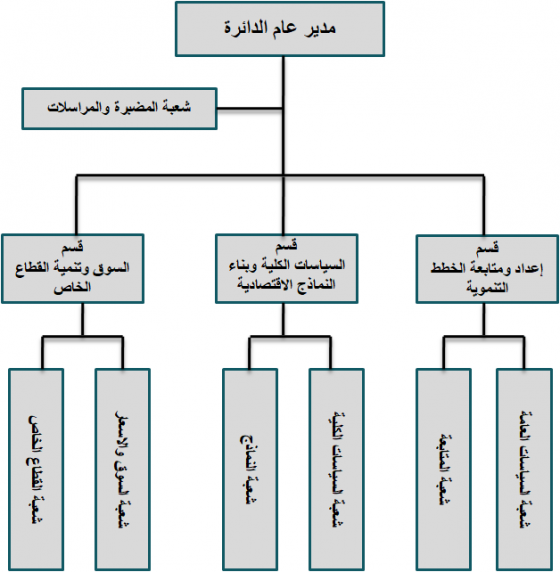Department of Economic and Financial Policies
The Department of Economic and Financial Policies is one of the priority departments in the ministerial formation of the Ministry of Planning Center in accordance with the Ministry’s Law No. (19) of 2009.
The department consists of three sections, It carries out its tasks through a specialized cadre of Ph.D., Master’s and Bachelor’s degree holders in economics, statistics and management, as well as administrative specializations to carry out administrative tasks.
The department seeks, through continuous improvement steps, to focus on quantitative analysis methods and develop the capabilities of the employees in the department by involving them in specialized courses, computer programs courses, and postgraduate studies, especially in the field of economic modeling, introducing modern technology through the use of computers in completing daily tasks, and opening doors for cooperation with universities. Iraqi and foreign to benefit from scientific and practical experiences to develop methods of implementing the tasks assigned to the department.
Vision:
A solid institution that has an active role in drawing up plans for economic policies and contributing to the state’s economic decision-making process
the message:
Contribute to the development of the performance of the Iraqi economy and work to create a balanced and diversified economy in a way that enhances the status of the Iraqi economy through setting and developing plans, policies and studies capable of achieving these goals.
The current main tasks and duties of the Department of Economic and Financial Policies:
The Department of Economic and Financial Policies undertakes the tasks and specializations listed below in accordance with what was stated in the Ministry of Planning Law No. (19) for the year 2009 and instructions No. (1) for the year 2012 in cooperation and coordination with the technical and sectoral agencies, formations and departments in the ministry and with the ministries and agencies not associated with a ministry as follows:
1. Proposing economic policies in various fields and following up and evaluating their results.
2. Contribute to the preparation of five-year plans and follow up on their implementation.
3. Developing models for the national development plan and measuring the targeted growth rates.
4. Participate in setting the state’s general budget strategy.
5. Preparing the Iraqi economy report.
6. Contribute to the follow-up of achieving the objectives of the national development plans.
7. Building standard models for the Iraqi economy and developing economic forecasting methods.
8. Monitoring the performance of financial and monetary indicators and their implications for the overall economic performance.
9. Follow-up indicators of the private sector and its role in achieving economic development.
10. Preparing reports related to inflation, movement and development of global markets and everything related to price policies in Iraq.
11. Preparing studies, discussion papers and reports on various economic issues.
12. Expressing opinions and consultations on all economic issues that come to the Economic Department.
13. Evaluation of the economic and technical feasibility studies for government investment projects submitted by the ministries and concerned authorities that come to us.
14. Participate in the work and tasks of the internal and external committees.
15. Giving advice and assistance to postgraduate students.
Firstly: Tasks and Duties of the Department of Macro Policies and Building Economic Models:
1. Proposing and preparing economic policies, including economic reform policies.
2. Contribute to the preparation of development plans and their economic indicators in their total and sectoral dimensions, in coordination and cooperation with the ministries, agencies and technical departments in the ministry.
3. Contribute to the evaluation of economic feasibility studies for investment projects in coordination with the concerned departments in the ministry.
4. Expressing economic and technical opinion and advice on many issues, reports, studies and research received from various parties.
5. Participation in the committees for preparing and following up the investment curriculum.
6. Contribute to the preparation of papers for the national development plan.
7. Participate in setting standards for evaluating feasibility studies for investment projects.
8. Attending and participating in courses and workshops inside and outside the Ministry.
Tasks of the Macroeconomics Division:
1. Preparing annual reports of the Iraqi economy.
2. Preparing the financial policy evaluation report.
3. Preparing the monetary and banking policy evaluation report.
4. Preparing a summary of the reports of the economies of foreign countries.
5. Preparing observations, proposals, recommendations, and a statement of opinion on various economic, financial, and development issues referred to the Division.
Functions of the Economic Models Division:
1. Work on modeling the Iraqi economy.
2. Following up on the evolution of the trends of the main variables of the Iraqi economy and developing standard treatments for them.
3. Conducting a quantitative and standard analysis of the indicators of the national development plan.
4. Setting future forecasts for the indicators of the Iraqi economy.
5. Statement of opinion on the various economic, financial and development issues referred to the Division.
secondly: Tasks and duties of the Market and Private Sector Development Department
1. Follow-up indicators of the Iraqi economy.
2. Setting criteria for evaluating feasibility studies for investment projects.
3. Participation in the committees for the preparation and follow-up of the investment curriculum.
4. Follow up the movement of markets in Iraq.
5. Follow-up indicators of the private sector in Iraq.
6. Follow up the implementation of the private sector development strategy in Iraq.
7. Preparing annual reports related to inflation in the Iraqi economy in cooperation with the Central Statistical Organization.
8. Preparing annual reports related to the movement and developments of global markets.
9. Preparing studies and research on the Iraqi economy annually.
10. Expressing opinions and proposals on economic and development issues submitted to the department.
11. Participation of the department’s employees in seminars, conferences and courses inside and outside the ministry.
12. Providing support, assistance and advice to all postgraduate students from various Iraqi ministries and universities.
13. Participation of the department’s employees in committees, according to specialization.
Duties of the Market and Prices Division:
1. Preparing the annual inflation report and following up the general level of prices.
3. Preparing a report on commodity markets in the world.
4. Annually updating the price policy evaluation report in Iraq.
5. Preparing the Iraq Stock Exchange report and other indices.
6. Follow-up indicators of inflation and prices in the Iraqi economy.
7. Follow-up indicators of the movement of the Iraqi economy.
8. Preparing a report on investment climate indicators annually in Iraq and other countries.
The tasks of the Private Sector Development Division:
1. Follow up the private sector development strategy.
2. Follow-up indicators of economic changes for the private sector in Iraq.
3. Follow-up indicators of foreign trade of Iraq.
4. Follow-up indicators of domestic and foreign investment in Iraq, with a focus on investment opportunities available in the Iraqi economy.
5. Follow-up of international economic developments and their repercussions on the reality of the Iraqi economy.
6. Updating the booklet of laws and decisions of economic concern.
7. Participation in the work of the private sector development strategy committees.
8. Preparing a report evaluating trade policies in Iraq.
Third : Tasks and duties of the department of preparation and follow-up of development plans
1. Preparing and following up the implementation of national development plans.
2. Monitoring the indicators of the economic sectors in the Iraqi economy.
3. Follow up the general policy of the Ministry.
4. Follow up the government program of the ministry.
5. Monitoring the National Development Plan Objectives Indicator System (INMS)
6. Preparing annual studies and research within the department’s work plan.
7. Participation in holding workshops and giving lectures on developmental and economic issues.
8. Providing technical expertise and economic advice to researchers and postgraduate students in Iraq.
9. Contribute to the membership of internal and external committees, according to specialization.
10. Expressing opinions and advice on economic and development issues.
Duties of the Public Policy Division:
1. Following up the preparation and implementation of public policy initiatives for the Ministry’s departments in accordance with the government program and the national development plan.
2. Coordinating with the general policy team in the General Secretariat of the Council of Ministers in preparing the general policies of the ministry in line with the government program.
3. Building an integrated database and information for public policies in the ministry.
4. Preparing the unified general framework report for the ministry, according to the government program and the directives of the General Secretariat of the Council of Ministers.
5. Follow up the government program of the ministry.
Follow-up Division tasks:
1. Follow up the preparation of the national development plan.
2. Developing a methodology for preparing national development plans.
3. Follow-up to achieve the objectives of the medium and long-term development plans.
4. Completing the database of indicators of the objectives of the national development plan.
5. Issuing the annual report to follow up on achieving the goals of the National Development Plan.
Fourthly: Duties of the Secretarial and Correspondence Division
1. Follow-up of incoming and outgoing mail.
2. Archive all incoming mail to the department.
3. Contribute to collecting and standardizing the answers of the departments.
4. Follow-up of all departments in the accomplishments of the tasks assigned to them.
5. Participation of the division staff in work training courses.
6. Follow up the committees of the general manager.
7. Participation of the Division’s employees in the work committees.
8. Unifying the annual work plan submitted by all departments.
- Small business guide
- The foundations of feasibility studies for development projects for the year 2008
- Market performance and the development of commodity prices
- Iraqi Economy 2020
- National Development Plan 2018 – 2022
- Forecasting economic variables
- 2017 Inflation Report
- commodity markets in the world
- Summary of the National Development Plan (2013-2017)
- Document of the National Development Plan (2013-2017), Part 1
- Document of the National Development Plan (2013-2017), Part 2
- Document of the National Development Plan (2013-2017), Part 3
- Second Quarterly Report 2015
- First Quarterly Report 2015
- Iraqi economy 2014
- The annual inflation of the Iraqi economy for the year 2013
- Executive summary on average development during the third quarter 2012
- Iraqi economy report for the year 2012
- Third quarter inflation report 2012
- Iraqi Economy Report 2019 Part 1
- Iraqi Economy Report 2019 Part 2
- Iraqi Economy Report 2019 Part 3
- Assessment of Fiscal Policy in Iraq 2019 Part 1
- Assessment of Fiscal Policy in Iraq 2019 Part 2
- Assessment of monetary and banking policy in Iraq 2019
- The latest financial changes report
- Financial variables tables and forms
- Building a standard model for analyzing macroeconomic indicators in Iraq


